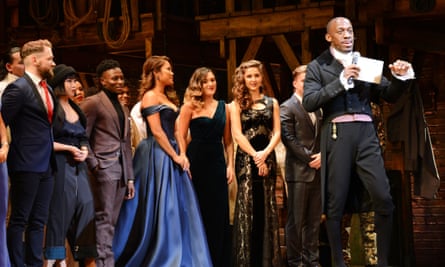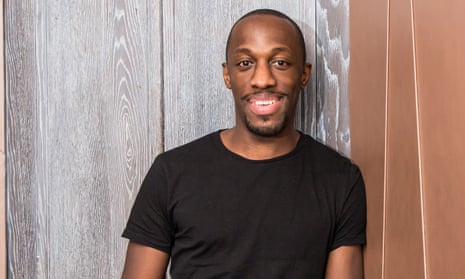The British actor Giles Terera has appeared in many critically acclaimed stage productions, including The Tempest, The Book of Mormon and Ma Rainey’s Black Bottom, but is best known for his portrayal of Aaron Burr in the London production of Lin-Manuel Miranda’s musical Hamilton, which won Terera an Olivier award. Last year, he was appointed an MBE for services to theatre; his book, Hamilton and Me: An Actor’s Journal, has just been published.
You found out on your 40th birthday that you’d got the role of Aaron Burr in Hamilton. How did you feel?
I felt a strong connection to him, like I knew the character. Like when you meet someone and you just click – it felt like that.
Your book, Hamilton and Me, is essentially a diary documenting the audition, rehearsal and performance process. What was your aim in writing it?
I read a couple of really influential books when I was starting out – Peter Brook’s The Empty Space and Antony Sher’s Year of the King. I found those two really freeing in terms of following your instinct and connecting with your imagination. My diary looks at the process – not the pop cultural phenomenon, but the day-to-day work; the nuts and bolts. My hope is that other young actors will be able to look at it and apply it. Whether they’re doing their second year performance at drama school or about to make their debut on stage.
How did Lin-Manuel Miranda react to it?
I sent the manuscript to him, and about two hours later he emailed saying that he had read the entire thing and was quite emotional as he was writing. He was very grateful that I’d been taking notes and had documented the experience. So that was a good day.
You say “not only was I playing this character, I was being taught by him”. What did you mean by that?
Burr is someone who is quite brittle, emotionally and spiritually. He’s all or nothing. In many ways I’m quite similar to Burr, and in many ways I’m not. I have never actually shot someone. But something I learned was that you can’t be brittle or else you have to be prepared for the consequences. The character has such an intense journey, and as an actor you have to find a way to not be completely taken over by it. Otherwise you go crazy.

What are your thoughts on the historical inaccuracy of Hamilton, and the fact that the founding fathers’ being slave owners was not mentioned much throughout the play?
It didn’t take me very long in my research to find out about Thomas Jefferson’s slave-owning history, which is very well documented. At the same time I found research that Burr was on very good terms with African Americans. He entertained them in his house for dinner. They’re all very contradictory characters. My hope is that people are at least being brought to the subject. They can then find out more.
In your speech at the Olivier awards, you praised being a part of such a diverse cast and said that Hamilton wasn’t a box-ticking exercise. What compelled you to make that statement?
Because it was true. I didn’t really think a lot about what I was going to say, but once I was there, I just said what I had always felt. In Hamilton, it wasn’t just black actors and white actors – we had people from all different backgrounds. I was just really grateful to be in that environment.
Your debut play, The Meaning of Zong, is premiering at Bristol Old Vic in September. What’s it about?
It’s based on a historical event, a massacre [of 130 enslaved Africans] on board a Liverpool-owned ship and the trial which took place as a result of it. It looks at two figures at the time, Granville Sharp and Olaudah Equiano, who used that story to bring awareness to the public. It was one of the events that succeeded in bringing together like-minded peopleto oppose the slave trade.
Why is now the right time to tell that story?
The legacy of that event is still being played out today. There was a huge bailout [after the Slavery Abolition Act of 1833, the British government paid £20m in compensation to registered owners of freed slaves for the loss of business assets], which contributed [to] setting up some of Britain’s biggest families. A lot of the companies that are a part of our lives have their origins in that time period. What the slave trade meant to the British economy is vast. The statue of Edward Colston was chucked into the water in Bristol because we’re walking past this legacy every day. We have to be accountable if we’re going to move forward in any kind of meaningful way, and so I really wanted to explore this particular story as a way of contributing to that conversation.
Your jazz, blues and funk-inspired recent song cycle, Black Matter, explores living in Soho. How did that work come about?
Soho was completely empty during the lockdown. I’d never seen that before. When things started to ease, people were out in the streets and protesting. I just found myself looking out of the window and writing. After about two weeks, I had a collection [of songs]. A friend of mine runs [music and cabaret venue] the Crazy Coqs and he called me up. We were going to do it with a live audience. When that was no longer an option, we filmed it instead.
How do you see the arts sector recovering in the aftermath of the pandemic and Brexit?
We are very durable and adaptable, and in two years’ time we will know about what happened because of the people that will create art about it and compose about it. But it is an industry and it needs forward planning. When the rug is pulled, or no provisions are there, it’s very difficult to sustain.
What message do you have for our politicians?
We have to acknowledge what the creative arts bring to our society and to our economy. The industry is in huge need of help, so I would like to see action. What would last year have been like if you couldn’t listen to music?
You have a twin sister who you have thanked in speeches. As your career has soared, what has that relationship meant to you?
Her name is Nicola, she’ll want that in! We’re really different. She always says: “I can’t think of anything worse than getting on stage!” This month I’ve got to go to the investiture for my MBE. I’m taking her with me because she’s the most encouraging. She comes to all of my shows. Though with Hamilton she said: “I liked Obioma [Ugoala] as Washington. He was great.” She’ll talk about everyone else but me! She wants to keep my feet on the ground. I have to give her props. In London, it’s all very insular. It’s good to have someone who has nothing to do with the industry and who doesn’t really give a shit about the things that I do.
Hamilton and Me: An Actor’s Journal by Giles Terera is published by Nick Hern Books, £16.99. To support The Guardian and Observer, order your copy at guardianbookshop.com. Delivery charges may apply. Terera’s debut play, The Meaning of Zong, will be at Bristol Old Vic from 11 September to 2 October
